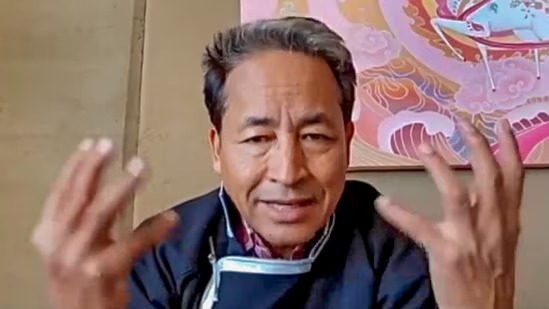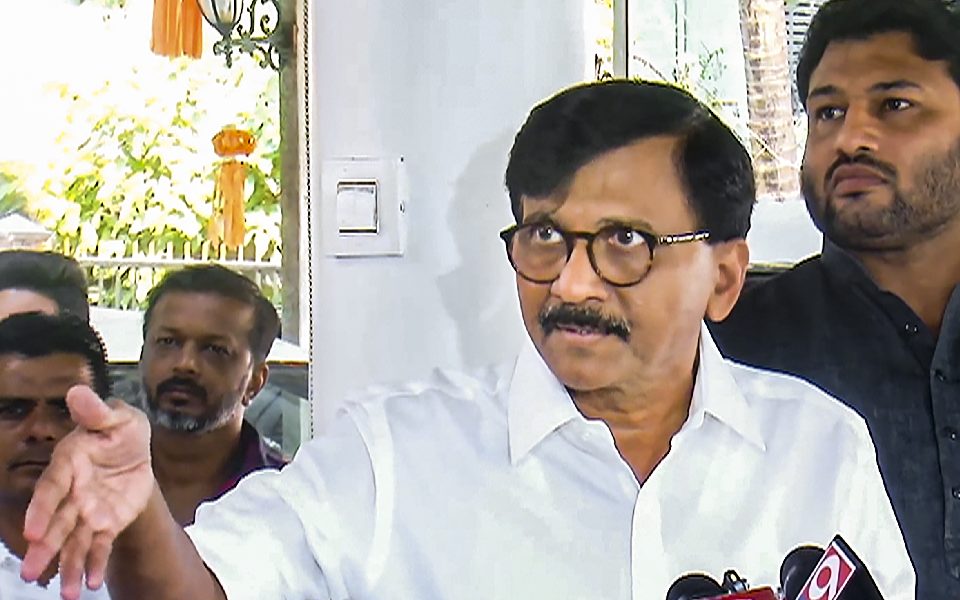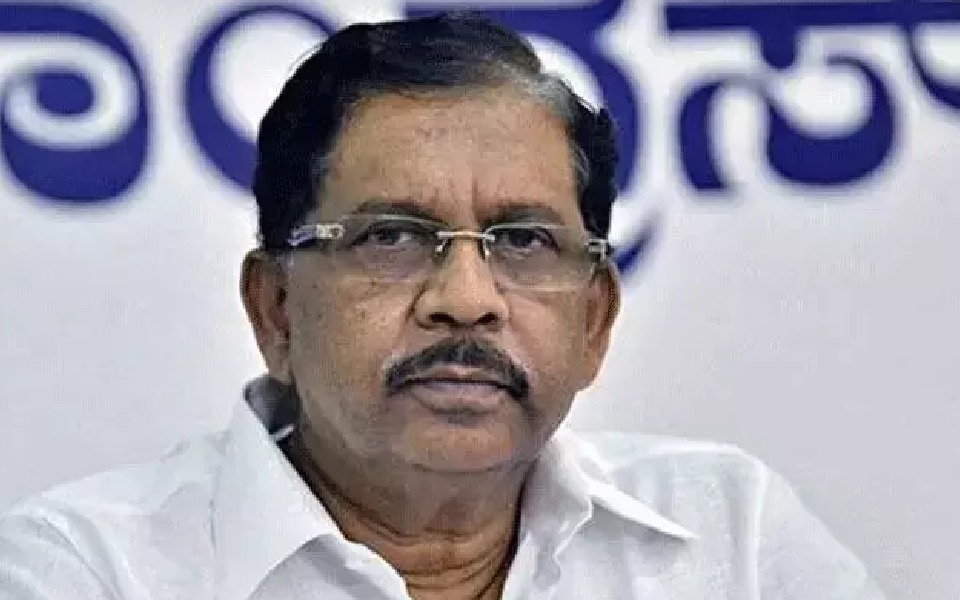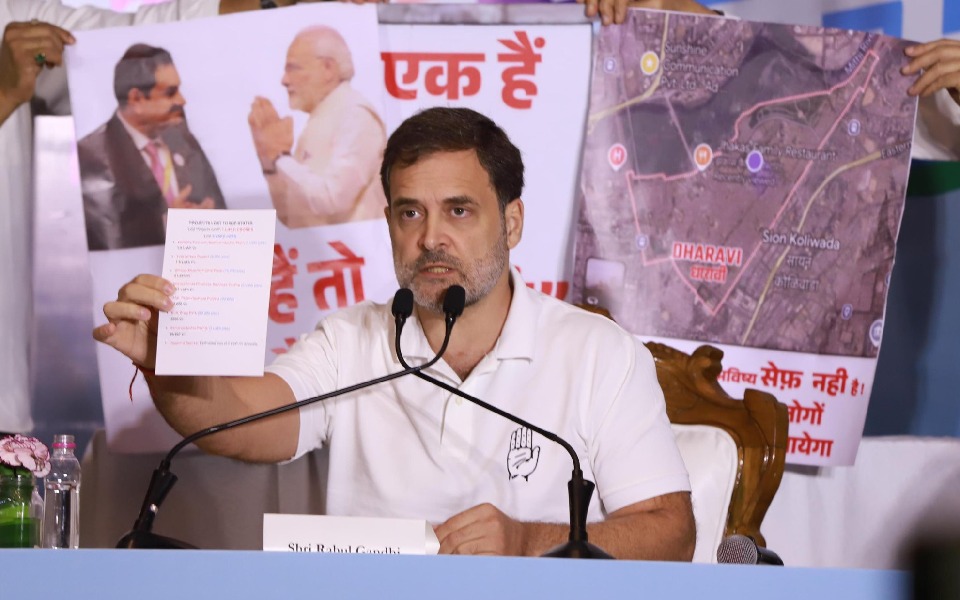New Delhi (PTI): Elections alone don't make a country a democracy, it becomes one only when the voice of the people is heard, climate activist Sonam Wangchuk, who has been sitting on a fast in Delhi for the last 14 days, said.
Wangchuk, who led a padayatra from Leh to Delhi, was detained last month with several of his supporters and later released.
Since then, he has been sitting on an indefinite fast at Ladakh Bhawan here with about two dozen of his supporters, demanding a meeting with the country's top leadership.
There has been no communication from the government so far regarding any meeting.
The activist, who has been subsisting on salt-water solution since October 6, also rued that his supporters were being stopped from meeting him by heavy barricading erected around the building, which got a separate identity after being split from Jammu and Kashmir Bhawan.
Frail after days of fasting, Wangchuk spoke softly but minced no words.
"As you can see, there are restrictions here (at Ladakh Bhawan). They are controlling who can come inside and who can't. They are not even allowing people to assemble in the park here. Perhaps there is some fear of the support we are getting. They are scared of people who want to sit quietly on a fast," Wanghcuk told PTI in an interview.
On September 30, Wangchuk, along with 150 others, was detained from Delhi's Singhu border, where hundreds of police personnel were deployed on the day they arrived.
After being kept in detention for almost two days, they were taken to Rajghat on October 2, Gandhi Jayanti, and released later with an assurance of a meeting with the top leadership.
However, when no such meeting came, Wangchuk declared an indefinite fast, but could not get permission to sit at Jantar Mantar, the usual site for protests in Delhi.
Wangchuk said he is being kept in "virtual detention" at Ladakh Bhawan.
Last Sunday, the activist gave a call to his supporters to join them for a 'maun vrat' (silent protest) at the park outside the Bhawan, but it was not allowed and those who came were detained.
Wangchuk said what happened to them since they came to Delhi cannot be called democratic.
"It is sad for democracy. Citizens came to the national capital from one end of the country, from the border area... 150 people, which included those above 80, women, and retired soldiers who protected the borders of India. After coming to Delhi they were detained, and then forced to sit on a fast," he said.
"Despite all this, they (government) are not even ready to listen. I do not know how to call it democracy... Only elections don't make a country a democracy, you have to respect people and people's voice. I am sad for democracy, that too for the world's biggest democracy," he said.
"Government should not be so ruthless in democracy, especially when it's about people who have come from a border area. We have protected our borders for years, in 5-6 wars. Such behaviour can affect people's morale, and their patriotism may get affected," he said.
His message to the people meanwhile is not to be scared.
"To people, I would say don't be scared, you are living in a democracy … Don't live with your head hanging low, it's despicable," he said.
The Ramon Magsaysay awardee, known for his work in the field of alternative education and climate conservation, has also been facing attacks on social media, even being called an "anti-national".
Asked about the sallies, he said, "It is unfortunate that those who are patriots are being called anti-national. They should instead work on converting those who are anti-national into patriots. This is misplaced hard work."
The activists continue to spend nights in the open. They sit in a small park right at the gate of Ladakh Bhawan during the day, with some basic mattresses and mosquito nets, which came after days of protest, as means of comfort.
Mosquitoes and high temperatures in the last few days are no help either to the protesters who have come from a colder, more pristine climate. All the same, Wangchuk says he will stay put.
"So far no one has approached us. We will keep sitting here. We are not in any hurry. As the protest continues, perhaps the government would listen," he said.
"We are not saying give us a final verdict today, we are just urging them to resume the talks," he added.
The Union Home Ministry was earlier in talks with a group of representatives from Leh Apex Body and Kargil Democratic Alliance over their demands that include safeguards under the Sixth schedule.
The protesters are also demanding statehood, a public service commission for Ladakh, and separate Lok Sabha seats for Leh and Kargil districts.
Asked about the difference between his protest in Ladakh and the one here, Wangchuk said in Ladakh at least there was no restriction on people joining a fast.
"People would gather, there was no nuisance, and people would sit and pray, and observe fast.
"This is the national capital, and we are shocked to see this," he said.
Let the Truth be known. If you read VB and like VB, please be a VB Supporter and Help us deliver the Truth to one and all.
Mumbai, Nov 25: Shiv Sena (UBT) MP Sanjay Raut on Monday demanded a re-election in Maharashtra using ballot papers, claiming there were irregularities with the electronic voting machines (EVMs).
Talking to reporters, Raut alleged several complaints about EVMs malfunctioning and questioned the integrity of the recently held elections.
The BJP-led Mahayuti won 230 out of 288 seats in the assembly elections, while the opposition Maha Vikas Aghadi managed 46 seats, with Shiv Sena (UBT) winning just 20 out of 95 seats it contested.
"We have received nearly 450 complaints regarding EVMs. Despite raising objections repeatedly, no action has been taken on these issues. How can we say these elections were conducted fairly? Hence, I demand that the results be set aside and elections be held again using ballot papers," Raut said.
Citing some instances, he said a candidate in Nashik reportedly received only four votes despite having 65 votes from his family, while in Dombivli, discrepancies were found in EVM tallies, and election officials refused to acknowledge the objections.
The Sena (UBT) leader also questioned the credibility of the landslide victories of some candidates, saying, "What revolutionary work have they done to receive more than 1.5 lakh votes? Even leaders who recently switched parties have become MLAs. This raises suspicions. For the first time, a senior leader like Sharad Pawar has expressed doubts about EVMs, which cannot be ignored."
Asked about the MVA's poor performance in the elections, Raut rejected the idea of blaming a single individual.
"We fought as a united MVA. Even a leader like Sharad Pawar, who commands immense respect in Maharashtra, faced defeat. This shows that we need to analyse the reasons behind the failure. One of the reasons is EVM irregularities and the misuse of the system, unconstitutional practices, and even judicial decisions left unresolved by Justice Chandrachud," he said.
Raut stressed that though internal differences might have existed within the MVA, the failure was collective.
He also accused the Mahayuti of conducting the elections in an unfair manner.
"I cannot call the elections fair given the numerous reports of discrepancies in EVMs, mismatched numbers, and vote irregularities across the state," Raut said.





